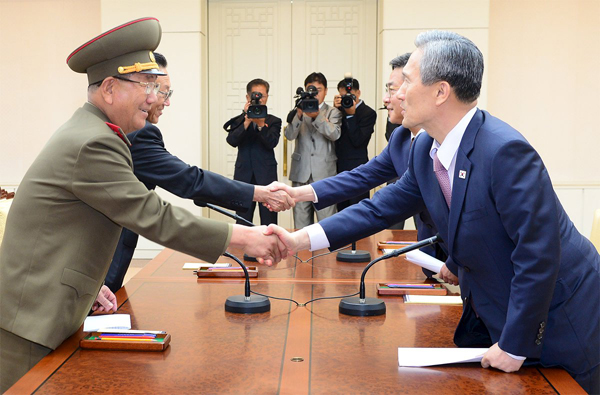Korean Peninsula needs more talks, not tension
Updated: 2015-08-26 07:51
(China Daily)
|
|||||||||||
 |
|
National Security Adviser of the ROK Kim Kwan-jin (R), Unification Minister of the ROK Hong Yong-pyo (2nd R), Secretary of the Central Committee of the Workers' Party of Korea Kim Yang Gon (2nd L), and Hwang Pyong-so (L), the top military aide to the DPRK's leader Kim Jong Un, shake hands after the inter-Korean high-level talks at the truce village of Panmunjom inside the Demilitarized Zone separating the two Koreas, in this picture provided by the Unification Ministry and released by Yonhap on August 25, 2015. [Photo/Agencies] |
It is a great relief that the Democratic People's Republic of Korea and the Republic of Korea reached a deal on Tuesday to ease the tensions that had built up on the Korean Peninsula since last week. Now more diplomatic efforts are needed among the parties concerned so as to foster long-term resolve to establish peace and stability on the peninsula.
The border between the DPRK and the ROK, the last legacy of the Cold War, is perhaps the most dangerous boundary in the world.
The latest round of tensions was triggered last week when two ROK soldiers were maimed by a land mine. In response, Seoul resumed its propaganda broadcasts at the border. It was feared the two neighbors were on the brink of war.
Under Tuesday's agreement, Pyongyang agreed to apologize for the land mine while Seoul agreed to halt the propaganda broadcasts. By agreeing to back away from further confrontation, both Pyongyang and Seoul have shown they know what lies ahead if they do not voluntarily defuse the tensions.
In recent years, several rounds of tensions have flared up between the two sides, each posing a threat not just to peace and stability on the peninsula but also beyond.
The cycle of tensions has deepened the decades-old animosity between the DPRK and the ROK, with Pyongyang's nuclear program aggravating the situation.
Since 2003, on and off dialogues and negotiations, under the framework of the China-initiated Six-Party Talks, have been held with the aim of non-nuclearization of the peninsula. But the talks have been stalled since early 2009.
However, the major breakthrough the international community achieved in resolving the Iranian nuclear issue last month could help in finding a solution to the DPRK nuclear issue as well. The strong political will and the spirit of diplomacy, which were the keys to breaking the Iran deadlock, should also be given a chance to resolve the DPRK nuclear issue.
In the meantime, as events in the past have shown, restraint is still important to prevent tensions from flaring up again and spinning out of control.
The latest tensions should also sound the clarion call for diplomatic efforts from all the parties concerned so as to build the momentum for an early resumption of the Six-Party Talks. No party will stay unharmed if a war breaks out on the peninsula.
Related Stories
Korean Peninsula remains in tight situation 2015-08-23 16:02
Iran deal 'not right blueprint' for Korean Peninsula 2015-07-29 11:22
US envoy urges 'unity' over denuclearization of Korean Peninsula 2015-05-30 21:04
China, US pay attention to Korean Peninsula 2015-05-19 10:29
China urges resumption of Korean peninsula denuclearization talks 2015-01-23 22:07
China: Cool it on Korean Peninsula 2014-12-24 12:08
Today's Top News
China cuts interest rate to bolster real economy
V-Day celebration to 'create new national history'
Shanghai index edges below 3,000 for first time in 8 months
China share plunge smacks world markets
30 heads of state to attend China's Victory Day celebrations
ROK, DPRK agree to defuse tension
Marathons emerge as ideal way to promote cities, earn revenue
China equities collapse sparks global markets sell-off
Hot Topics
Lunar probe , China growth forecasts, Emission rules get tougher, China seen through 'colored lens', International board,
Editor's Picks

|

|

|

|

|

|






